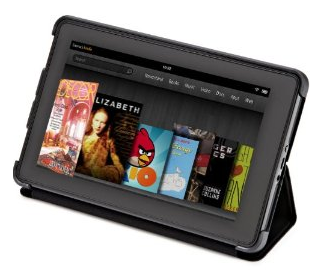 The holiday season has been over for awhile, and the sales boom that goes with it has leveled off. January and February are kind of a let down after the excitement of getting new gadgets for the holidays. Kindle Fire sales are proof of this conclusion.
The holiday season has been over for awhile, and the sales boom that goes with it has leveled off. January and February are kind of a let down after the excitement of getting new gadgets for the holidays. Kindle Fire sales are proof of this conclusion.
Does the slipping sales show signs of being short or long term? I’m not a business person by any means, but a little research and common sense shows that it is a combination of sales cycles and the novelty of a new gadget wearing off.
November and December usually have to carry a big chunk of the sales numbers for the year. Now that the Kindle Fire is in the hands of its users, it will be up to the Kindle Fire apps and accessories to carry the weight of sales revenue.
That leads into the whole “why Amazon sold the Kindle Fire at a loss” debate. They more than make up for it in the books and other extras available on the tablet. This model is applied to all members of the Kindle Family. The focus on the software rather than hardware has been a trend for awhile now.
By selling cheaper devices, Amazon opens up the opportunity for more people to purchase the tablet or e-reader, then it leaves them some cash left over to buy books, apps, covers, lights, you name it. So, I can definitely see the Kindle hardware get cheaper and cheaper while sales numbers for books and accessories go up. The key is to do cheap without compromising functionality.
But, back to thoughts on the slipping sales. The Kindle Fire recently got an update that included some much needed bug fixes. The update overall brought much better reviews for the tablet. But it is still leaving its consumers wanting more. Camera, 3G, bigger screen, and longer battery life are examples of features that would be good to have.
All of those things cause the price to go up. What balance can be struck to still provide a cheap tablet, yet give consumers what they want? With that said, I’ll be very interested to see what the next update, and subsequent generations of the Kindle Fire look like.
I love my Kindle Fire. I bought it about a month ago. I did own an iPad but sold it because it seemed redundant to my MacBook Air – which of course is a more capable device.
Personally, I like the smaller form factor of the Kindle Fire. It is wonderfully portable. I’m not tempted to use it as a creative device as I did with my iPad – which was always just a little frustrating.
The only two things I miss with my iPad compared to my Fire are the longer battery life and the much more stable iOS. I would consider an iPad again if I thought it could replace my MacBook Air – meaning a more elegant keyboard solution. I would be interested in upgrading my Kindle Fire if Amazon found a way to creatively stuff more battery into the same form factor. I’m not interested in a camera – except maybe a FaceTime sort of offering for video chats… It would be interesting to be both an Amazon Fire and iPad owner with no laptop – a scenario that would have seemed impossible only a year ago.
As far as Amazon selling at a loss… In the short term it’s great for consumers,.. But will Amazon be satisfied with this model in the future? It all depends on how Kindle Fire owners use their devices. Certainly a gamble for Amazon but that’s why I love both Apple and Amazon – they are big companies still making big bets.